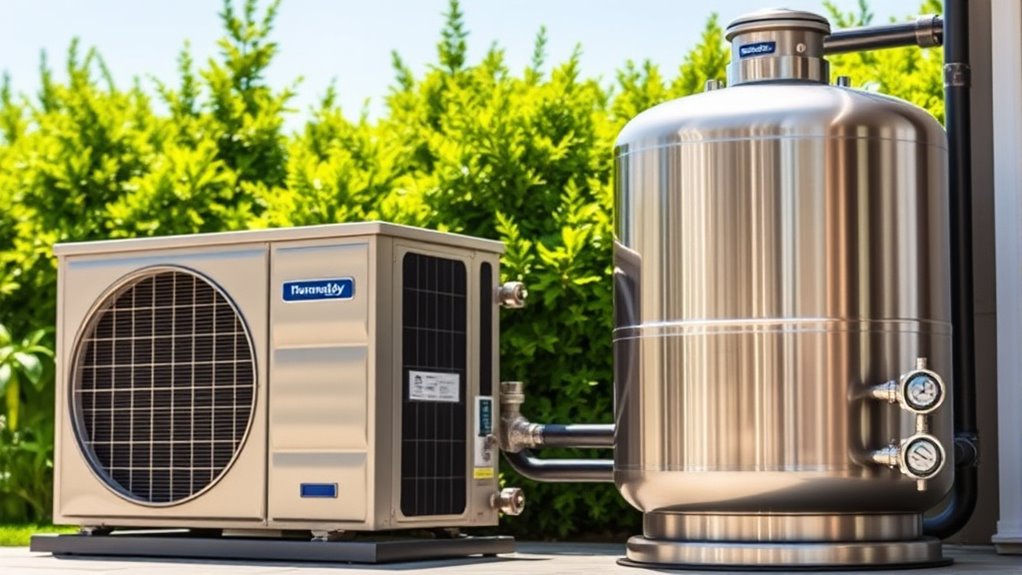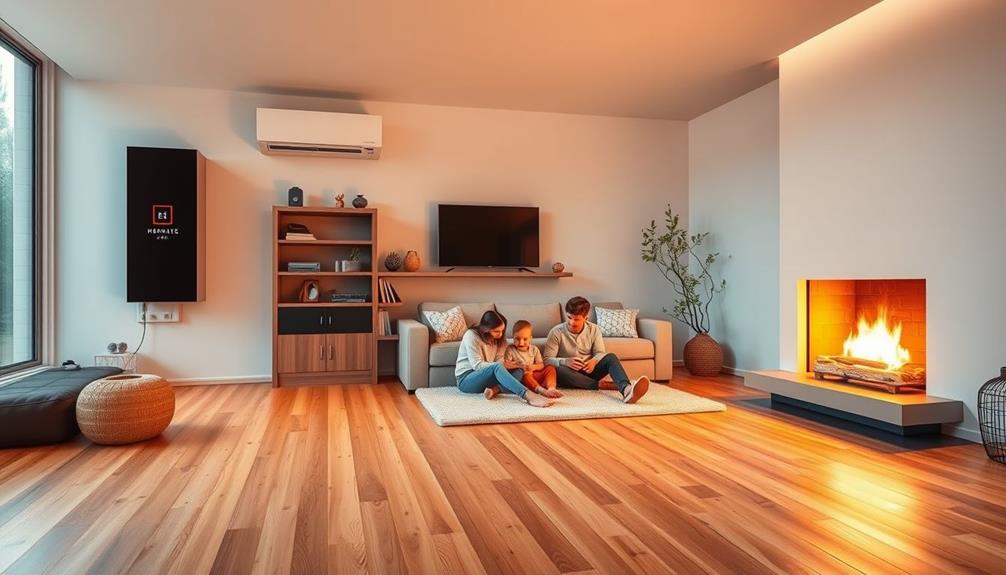Hybrid heating systems combine heat pumps with gas backups to keep your home warm efficiently. They automatically switch between energy sources based on outdoor temperatures, saving you money and reducing energy waste. These systems offer reliable warmth, lower utility bills, and are eco-friendly when paired with sustainable practices. With smart controls and zoning options, you get ideal comfort and easier management. To discover how to choose, install, and benefit from these systems, explore the full details below.
Key Takeaways
- Hybrid systems combine heat pumps and gas backup to optimize energy efficiency and ensure reliable heating.
- Smart controls automatically switch between heat pump and gas backup based on outdoor temperatures.
- Proper sizing, installation, and regular maintenance are essential for system efficiency and longevity.
- These systems reduce energy costs and carbon emissions by efficiently utilizing renewable and conventional energy sources.
- Future trends include smarter, more integrated controls and increased renewable energy adoption for sustainable heating.
How Hybrid Heating Systems Work
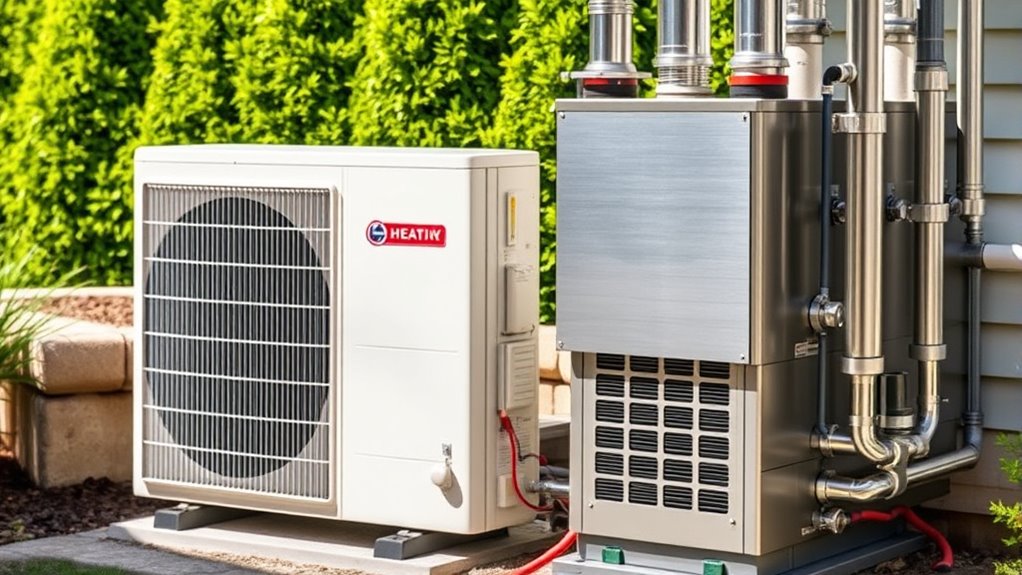
Have you ever wondered how hybrid heating systems efficiently combine different energy sources? These systems manage thermal regulation by switching between heat pumps and gas backup, ensuring your home stays warm. They use smart controls to monitor indoor temperatures and outdoor conditions, optimizing energy distribution for maximum efficiency. When the temperature drops, the system automatically activates the gas backup to maintain consistent heat, while during milder weather, the heat pump takes over to save energy. This seamless progression allows for effective thermal regulation without wasting fuel or electricity. By intelligently balancing the use of each energy source, hybrid systems provide reliable heating while reducing costs and environmental impact. You get consistent comfort, no matter the weather, thanks to this sophisticated energy management. Additionally, understanding the natural techniques involved in energy-efficient systems can further enhance overall performance and sustainability.
Benefits of Combining Heat Pumps With Gas Backup
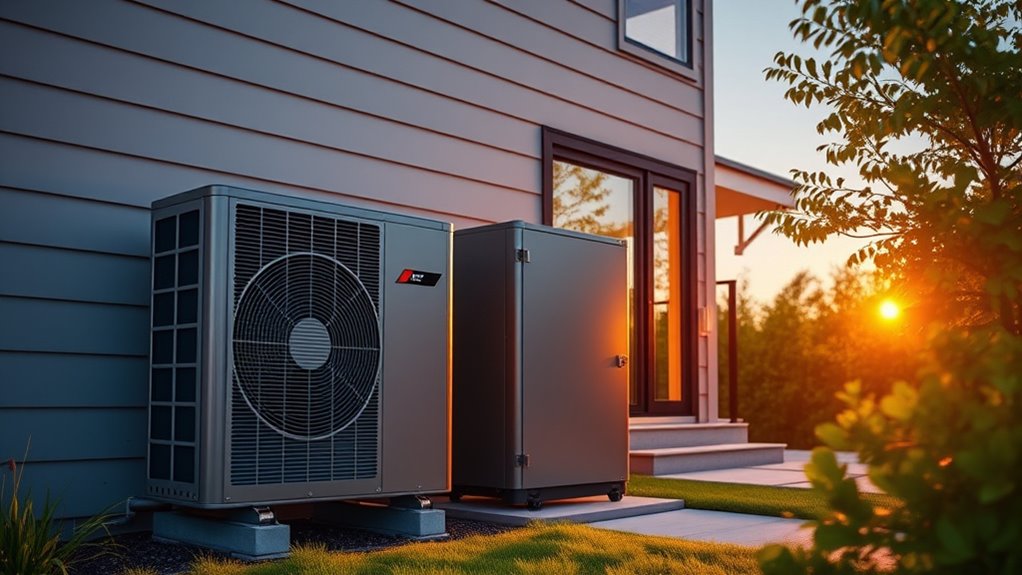
Combining heat pumps with gas backup offers significant advantages by enhancing your home’s heating reliability and efficiency. It guarantees consistent warmth during cold spells and reduces energy costs by switching seamlessly between systems. Smart thermostats and zoning controls optimize comfort and energy use, allowing you to set different temperatures in various areas. This integration simplifies managing your heating and maximizes efficiency. Additionally, modern heat pumps feature noise reduction technology, making them suitable for quiet operation in residential settings.
Choosing the Right Hybrid System for Your Home
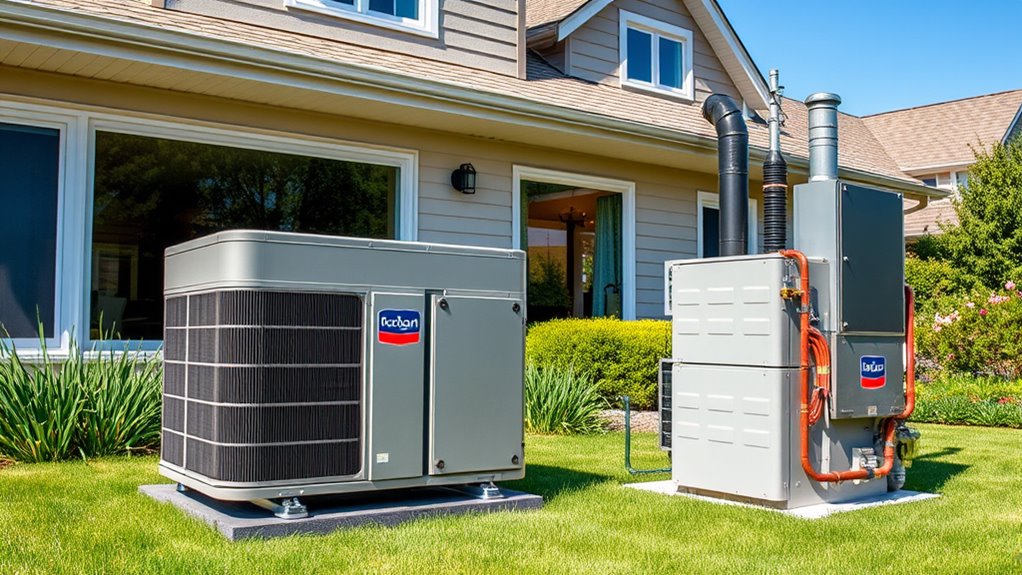
Choosing the right hybrid system involves evaluating your home’s specific heating needs, climate conditions, and your energy goals. Start by appraising whether your home requires frequent heating or occasional use, as this impacts system choice. Smart thermostats help optimize efficiency by adjusting settings based on your schedule and preferences, ensuring comfort without wasting energy. Zoning systems allow you to control different areas independently, making sure each space gets the right amount of heat. Consider your local climate—colder regions may benefit from a gas backup, while milder areas might rely more on the heat pump. Additionally, understanding sound healing science can inform you about how different heating systems might influence your indoor environment’s overall health and well-being. By analyzing these factors, you can select a hybrid system that balances performance, energy savings, and comfort tailored to your home’s unique demands.
Installation and Maintenance Considerations
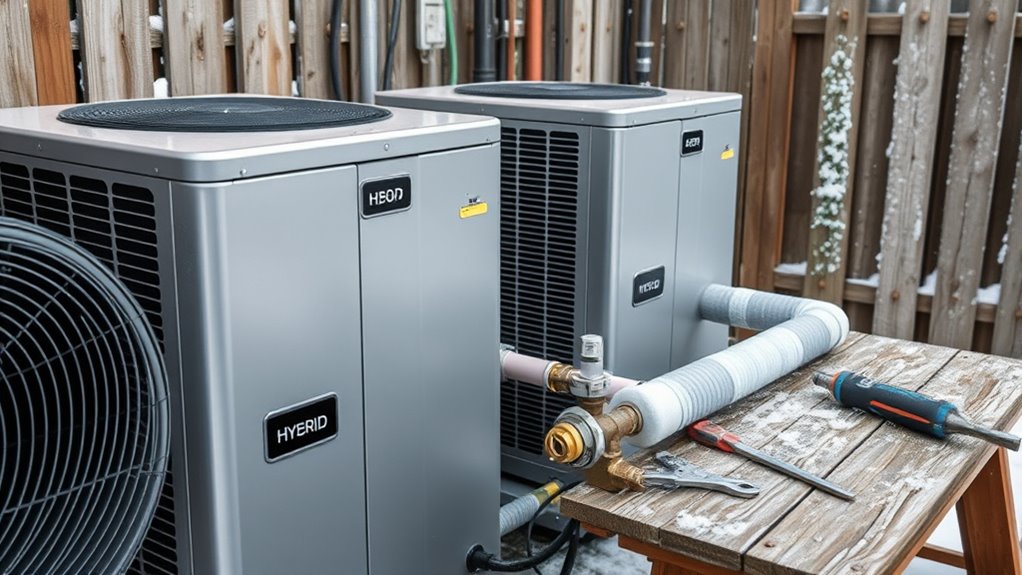
Proper system sizing guarantees your hybrid heating system operates efficiently and meets your home’s needs. Regular maintenance checks help prevent unexpected breakdowns and keep the system running smoothly. Paying attention to these considerations can save you time and money in the long run. Additionally, ensuring components like heat pumps and gas backup systems are correctly calibrated can optimize performance and energy savings.
Proper System Sizing
To guarantee your hybrid heating system operates efficiently and reliably, accurate sizing is vital during installation and maintenance. You need to determine the right system capacity to match your home’s heating demands, avoiding undersized or oversized units. Proper sizing ensures the heat pump and gas backup work together effectively, saving energy and reducing costs. Additionally, evaluating insulation requirements is essential; well-insulated homes require less capacity, making your system more efficient. Poorly sized equipment can lead to frequent cycling, uneven heating, and increased wear and tear. Work with professionals to conduct load calculations that account for your home’s size, layout, and insulation quality. Understanding system compatibility is crucial for optimal performance, as mismatched components can compromise efficiency and longevity. Correctly sized systems optimize performance, extend lifespan, and maintain comfort year-round.
Regular Maintenance Checks
Regular maintenance checks are key to keeping your hybrid heating system running smoothly and efficiently. Regularly inspecting your system ensures that smart thermostats and zoning controls operate at their best, helping you save energy and stay comfortable. Check your heat pump’s filters and coils, and ensure the gas backup components are clean and functioning properly. Update your smart thermostat’s firmware and verify that zoning controls are correctly calibrated to respond to your preferences. Scheduling professional inspections at least once a year helps identify potential issues early, preventing costly repairs. Proper maintenance also extends the lifespan of your system. By staying proactive, you maximize efficiency, reduce energy bills, and ensure reliable heating throughout the seasons. Proper sizing of heat pumps is essential for optimal performance and energy savings.
Cost Savings and Environmental Impact
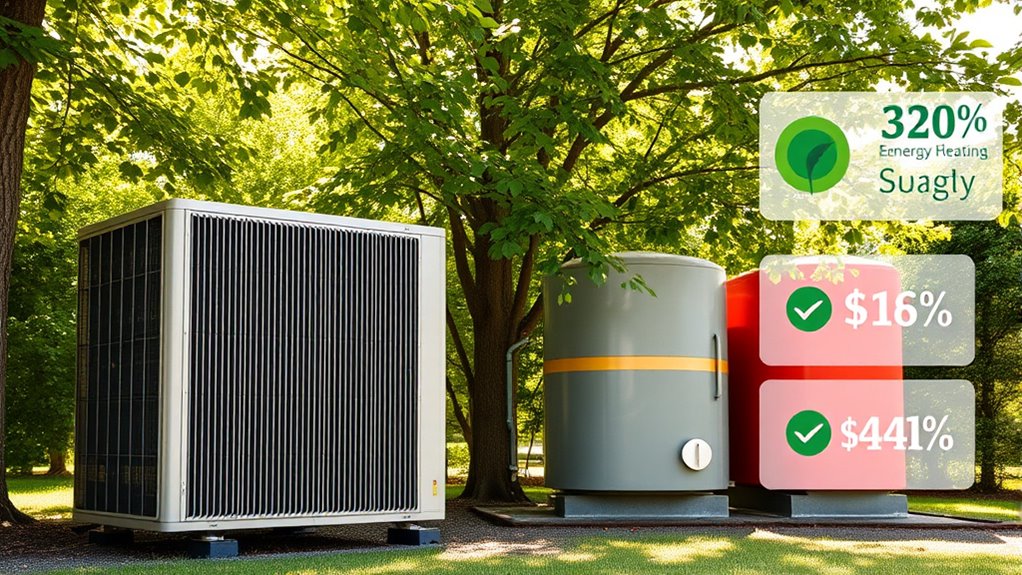
Switching to a hybrid heating system can substantially cut your energy bills while lowering your carbon footprint. You’ll notice improved efficiency as the system optimizes energy use across different sources. Additionally, Kia Tuning options for engine and suspension upgrades demonstrate how performance enhancements can be achieved through specialized modifications. Ultimately, this combination helps you save money and reduces environmental impact at the same time.
Lower Energy Expenses
Are you looking to cut energy costs while reducing your environmental footprint? Hybrid heating systems help you do just that by optimizing energy use. With smart thermostats, you can program your system for maximum efficiency, ensuring heating only where and when you need it. Zoning controls allow you to target specific areas, avoiding wasted energy in unused spaces. By switching between heat pumps and gas backup based on outdoor temperatures, your system runs more efficiently, lowering your utility bills. This targeted approach not only saves money but also minimizes unnecessary energy consumption. Incorporating Crochet Styles for Locs can inspire creative ways to personalize your space, making your environment more comfortable and inviting. Over time, these smart features and zoning controls make your heating system more cost-effective and environmentally friendly, helping you stay comfortable while being mindful of your overall energy expenses.
Reduced Carbon Footprint
By optimizing energy use with smart thermostats and zoning controls, hybrid heating systems not only save you money but also substantially reduce your carbon footprint. You can lower emissions by integrating renewable energy sources and fine-tuning your system’s operation. Here are three ways this benefits you:
- Using smart thermostats ensures your system runs only when needed, cutting unnecessary energy consumption.
- Incorporating renewable energy, like solar, further decreases reliance on fossil fuels, reducing greenhouse gases.
- Zoning controls allow you to heat only occupied areas, minimizing waste and lowering overall carbon emissions.
- Understanding energy efficiency principles can help you maximize these benefits for even greater environmental impact.
Together, these strategies help you contribute to a cleaner environment while enjoying cost-effective heating. Making smarter choices today supports a sustainable future for tomorrow.
Enhanced System Efficiency
Enhanced system efficiency in hybrid heating setups directly translates into significant cost savings and reduces environmental impact. By using smart thermostats, you can optimize heating schedules and minimize energy waste, ensuring your system operates only when needed. Zoning controls allow you to target specific areas, preventing unnecessary heating in unused spaces and improving overall efficiency. These technologies help balance the load between heat pumps and gas backup, maximizing energy savings while maintaining comfort. As a result, your home consumes less energy, lowering utility bills and decreasing your carbon footprint. Investing in smart thermostats and zoning controls makes your hybrid system more responsive and efficient, helping you save money and contribute to a healthier environment. Additionally, understanding the cost factors involved in installation and maintenance can further enhance your system’s efficiency and longevity.
Future Trends in Hybrid Heating Technology
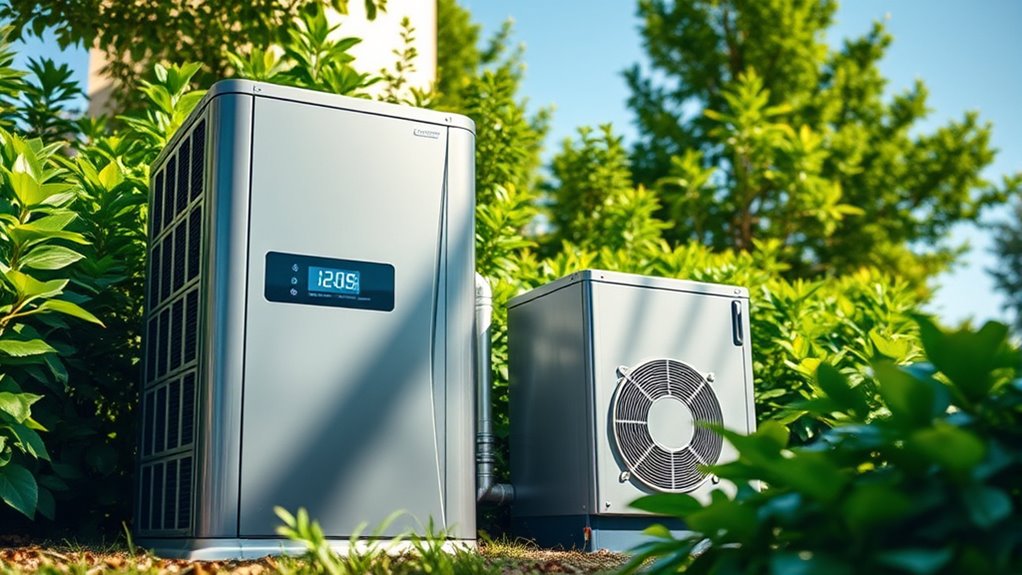
As technology advances, hybrid heating systems are poised to become more efficient, adaptable, and integrated with smart home innovations. You can expect smarter controls that optimize energy use based on real-time data, improving comfort and saving costs. Renewable integration will grow, allowing systems to harness solar or wind energy alongside traditional fuels, reducing carbon footprints. Future trends include:
- Advanced smart controls that learn your habits and adjust heating automatically.
- Seamless renewable integration, making it easier to incorporate green energy sources.
- Enhanced connectivity with home automation systems, enabling remote management and diagnostics.
These developments will make hybrid systems more sustainable, user-friendly, and responsive to your needs, paving the way for a smarter, greener future.
Frequently Asked Questions
How Does a Hybrid System Determine When to Switch Between Heat Pump and Gas Backup?
You might wonder how a hybrid system decides when to switch between the heat pump and gas backup. It uses temperature sensors to monitor indoor and outdoor conditions continuously. Control algorithms analyze this data, determining the most efficient heat source at any given moment. When outside temperatures drop below a certain point, the system switches to gas backup to maintain comfort and efficiency, automatically optimizing performance.
Are Hybrid Systems Suitable for All Climate Zones or Only Specific Areas?
Think of hybrid systems like versatile tools that adapt to their environment. They’re not a one-size-fits-all solution; their climate adaptability depends on geographic suitability. In milder zones, they perform efficiently, but in extremely cold areas, their effectiveness drops, making them less ideal. So, you should consider your local climate before choosing a hybrid system, ensuring it suits your region’s temperature range for ideal comfort and efficiency.
What Is the Typical Lifespan of a Hybrid Heating System’s Components?
You’re curious about the typical lifespan of a hybrid heating system’s components. Generally, these systems boast good component durability, with heat pumps lasting around 15-20 years and gas backup units often reaching 20-25 years. Proper maintenance guarantees system longevity, helping you get the most out of your investment. Keep an eye on wear and tear, and schedule regular check-ups to extend the lifespan of each component.
Can Hybrid Systems Be Integrated With Smart Home Energy Management Systems?
You can absolutely integrate hybrid heating systems with smart home energy management systems. By using a smart thermostat, you gain the ability to optimize energy consumption, ensuring your system runs efficiently. This integration allows you to monitor and control your heating remotely, reduce energy waste, and improve overall comfort. With smart technology, your hybrid system becomes more responsive, helping you save money while maintaining a cozy home environment.
What Maintenance Requirements Are Unique to Hybrid Heat Pump and Gas Backup Systems?
With hybrid heat pump and gas backup systems, you need to perform unique maintenance tasks. You should regularly check system calibration to guarantee maximum efficiency and performance. Refrigerant checks are essential to prevent leaks and maintain proper cooling and heating functions. Additionally, keep an eye on both the heat pump and gas backup components, scheduling professional inspections annually to catch potential issues early and keep your system running smoothly.
Conclusion
Just as Icarus dared to fly higher, embracing hybrid heating lets you soar toward energy efficiency and comfort without overreaching. By blending heat pumps with gas backup, you’re balancing innovation and reliability, carving a path toward a sustainable future. As you navigate installation and costs, remember that this approach isn’t just a modern choice—it’s a step toward a greener world, echoing the timeless quest for progress without losing sight of our roots in responsible living.
